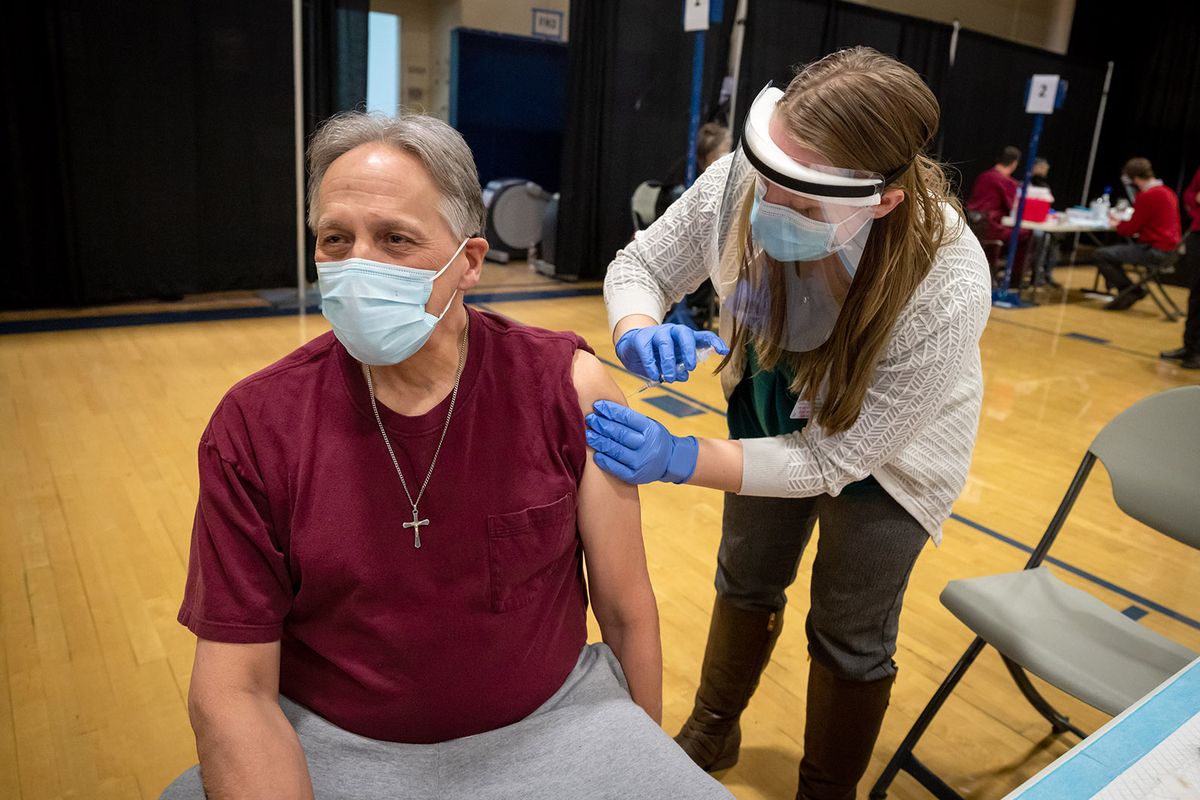Gonzaga hopes to be a key player in the area’s COVID-19 vaccine rollout. A CHAS clinic is the first step

Gonzaga University wants to distribute COVID-19 vaccines in the community, and last week, they got a good trial run to see how that might work.
When CHAS Health received more than 8,000 first doses directly from the federal government and needed space to run a large vaccination clinic for its own patients, they called Gonzaga.
The university, which already had started planning how it could offer vaccinations in the community, was able to offer space immediately, transforming part of the Martin Centre into a five-day vaccination clinic for CHAS patients in a matter of days.
University President Thayne McCulloh said Gonzaga has applied to the Department of Health to be a point of distribution in order to receive vaccine doses directly from the state.
Preparations have been underway for those plans on campus, so when CHAS called, the university already knew how to manage space and prepare for a quick setup.
“When CHAS came to us we were much better prepared to say, ‘Yes,’” McCulloh said. “Even if it’s a trial run, it gives us a chance to work out the bumps and stuff. From my perspective, it’s well worth it.”
More than half of the volunteers at the five-day clinic are Gonzaga staff, students or faculty. Nursing students will get first-hand experience at administering shots. This is all good practice if the Department of Health authorizes Gonzaga to be a point of distribution for vaccines.

McCulloh knows that the majority of his faculty, staff and students will not be eligible for the vaccine in the next couple months, but he has a broader vision for how the university can help the Spokane community get through the pandemic. He said the university has considered not only hosting vaccination clinics on campus but operating satellite clinics at other locations like churches or schools.
“We assumed that for some period of time, the vast majority of people who would need to be vaccinated were not part of our own community, but that we would be supporting the effort to … reach people in the community,” he said.
The university’s application to be a point of distribution is pending with the Department of Health, said Dr. Kristiana Holmes, Gonzaga’s director of health and counseling.
She and a team of COVID-19 response staff who have been working well beyond the confines of their day jobs responding to the pandemic are working on preparing the university to be a vaccine distributor. Holmes is working to ensure that the university can effectively keep and distribute vaccine in the near future. Among the challenges of running a vaccination site: ensuring there is enough cold storage to keep the vaccines frozen.
Under the licensing authority of the Health and Counseling Center overseeing physician, Gonzaga could receive vaccine doses, which both graduate and undergraduate students could help administer with supervision, Holmes said.
Gonzaga would work closely with the Spokane Regional Health District to get vaccine doses out to the community, Holmes said.
“Our goal is to focus on some of the underserved populations or the populations who have fallen into a gap receiving vaccine in the community,” she said. “And we’re working with SRHD partners to determine what that might look like.”
Holmes helped facilitate the CHAS clinic on campus, starting on Friday.
“There haven’t been any significant hiccups, which I think is a tribute to CHAS having run this drill before and the speed and efficiency with which Gonzaga was able to pull this together to get this set up,” she said.
Gonzaga will host the second-dose clinic in a month for everyone who receives their first dose of the Moderna vaccine at the five-day clinic, which ends on Tuesday.
McCulloh hopes that the CHAS clinic partnership will help support the university’s application to be a distributor at the state level.
“My hope is that the state does see that GU wants to be a part of helping out with this effort,” McCulloh said.